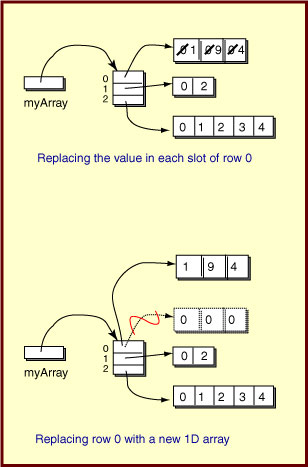myArray[0][0] = 1 ; myArray[0][1] = 9 ; myArray[0][2] = 4 ;

The following answer will not work:
myArray[0] = {1, 9, 4} ;
An initializer list can only be used to initialize an array, not to assign values to it after it already exists.
Perhaps your answer was:
int[] x = {1, 9, 4} ; // declare and init x
myArray[0] = x ; // assign to myArray
This will work, but does not quite do what the question asked. The suggested answer puts the values into the required cells of the existing 1D array object of row 0.
The not-quite-right answer replaces the old row 0 with a new row.
It constructs a new 1D array object
that holds the desired values in its cells,
then assigns that object to row 0 of myArray.
The previous row 0 is now garbage.
Both answers result in myArray containing what you want.
In most programs it will not matter which method you used.
(Thought Question: ) Can row 0 be replaced with an new 1D array that contains a different number of cells than the original row?